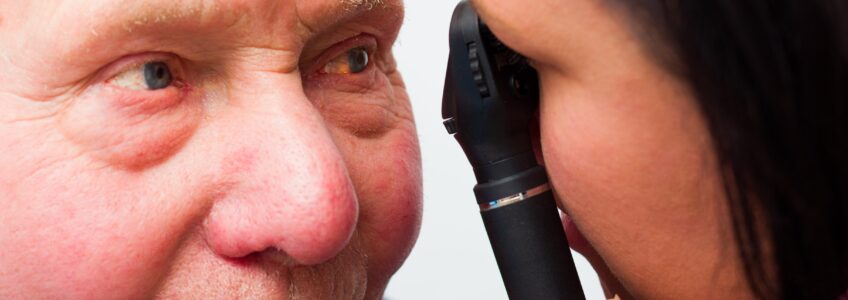
August is National Eye Exam Month, and if your senior mom or dad hasn’t had an eye exam recently, now is a great time to schedule one. It’s recommended that seniors get eye exams at least once a year and more often if they have chronic health conditions.
Seniors who have conditions like hypertension or diabetes, which can affect their eye health and vision, should get a vision screening every few months if possible. Changes in their eye health or vision could indicate changes in their overall health.
One of the reasons why seniors put off getting routine vision screenings and eye exams is because it’s difficult for them to the eye doctor. If your mom or dad doesn’t drive and you can’t take the time off from work to take them to an eye exam home care services can help. A home care provider can accompany your senior parent to their eye exam so that they don’t have to go alone.
Some of the common eye problems that affect seniors that can usually be detected during a routine eye exam are:
Cataracts
Cataracts are very common, but if caught early, they are often treatable. Cataracts are films that cause clouding of the eye’s lens, leading to blurry vision, difficulty with glare, and faded colors. If your senior parent is complaining to you or their home care providers that things are appearing blurry or out of focus, those could be early signs of cataract development.
Glaucoma
Glaucoma is actually a group of eye conditions that damage the optic nerve, often due to high eye pressure. It can lead to peripheral vision loss and, if untreated, total blindness. Early detection and treatment can help manage the condition.
If your senior mom or dad has high blood pressure or hypertension, that can increase their risk of developing glaucoma. Being a smoker or a former smoker can also increase the risk of developing glaucoma. Home care can help seniors with overall health while mitigating the effects of high blood pressure or hypertension.
Age-related Macular Degeneration (AMD)
AMD is a very common senior disorder that affects vision and eye health. It’s a disease that affects the macula, the part of the retina responsible for central vision. AMD causes blurry or distorted central vision, making it difficult to read, drive, or recognize faces. There are two types: dry and wet AMD.
Diabetic Retinopathy
If your senior parent has diabetes, they should get regular and frequent eye exams to check for any signs of diabetic retinopathy. If your mom or dad is having trouble controlling their diabetes, that can significantly increase their risk of diabetic retinopathy. Home care providers can help seniors with diabetes better manage their diet and activity to minimize blood sugar variations.
Diabetic retinopathy is a complication of diabetes that affects the blood vessels in the retina. It can cause vision loss and blindness if not properly managed. If your senior parent can bring their diabetes under control with medication and lifestyle changes, that can lower the risk that they will develop diabetic retinopathy.
Presbyopia
Presbyopia is age-related loss of the eye’s ability to focus on close objects. It typically becomes noticeable in the early to mid-40s and is commonly corrected with reading glasses, bifocals, or multifocal contact lenses.
It’s very common in seniors, and while it can become severe, most seniors can correct it with glasses. But if your senior parent has never worn glasses before, they may find it traumatic to need them as they get older.
If you or someone you know needs Home Care in St. Cloud, MN, contact Adara Home Health. We provide quality and affordable home care services for many fragile or senior members in the communities we serve. Call us at (888) 525-7742 for more information.

